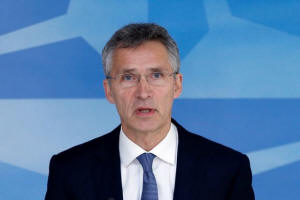|
NATO to agree eastern force to deter
Russia, some allies want more
 Send a link to a friend
Send a link to a friend
 [June 14, 2016]
By Robin Emmott and Phil Stewart [June 14, 2016]
By Robin Emmott and Phil Stewart
BRUSSELS (Reuters) - NATO was set on
Tuesday to agree deployment of a new force in the Baltics and Poland,
the last of a series of steps to deter a resurgent Russia but which some
allies say must go further to be credible.
Three weeks before a critical NATO summit in Warsaw, the
alliance's defense ministers will approve deployment of some 4,000
troops which, backed up by rapid reaction forces, could help deter a
repeat of Moscow's show of force in Crimea elsewhere.
"We don't seek confrontation with Russia, we don't want a new Cold
War," NATO Secretary-General Jens Stoltenberg said before the
meeting in Brussels. He added: "NATO will continue to protect and
defend all allies from any threat."
But while eastern allies welcome the deployments of four battalions
of British, U.S., German and possibly Canadian troops in NATO's
biggest military build-up since the end of the Cold War, they want
more support to defend against Russia's powerful arsenal.
With a warning last week from a senior U.S. commander that the
alliance would have only 72 hours notice of a missile or ground
attack, Baltic nations and Poland want a sophisticated anti-missile
shield to deter Russia from gaining the upper hand.
 That could involve NATO fighter planes and surface-to-air missile
interceptors on a much larger scale in the Baltics.
Southern flank allies Bulgaria and Romania, meanwhile, are pushing
for NATO to expand its maritime presence in the Black Sea, where
Russia has a naval fleet, as well as more alliance troops to the
region.
NATO aims to counter Russia's military build-up in Crimea, which
Moscow annexed from Ukraine in 2014. The Black Sea is strategically
important for both East and West given its energy reserves and
closeness to the Middle East.
Stoltenberg said NATO was considering a Romanian offer to provide a
brigade, typically around 5,000 troops, which could coordinate
alliance training and possibly play a deterrent role. Defense
ministers will discuss this on Tuesday, diplomats said.
[to top of second column] |

NATO Secretary-General Jens Stoltenberg briefs the media during a
NATO defence ministers meeting at the Alliance headquarters in
Brussels, Belgium, June 14, 2016. REUTERS/Francois Lenoir

Moscow sees NATO's deterrence plans as hostile. Moscow's envoy to
the alliance has warned they threaten peace in central Europe. The
Kremlin also says a U.S. ballistic missile shield, which Washington
says is directed at protecting the alliance from Iran, is also
escalating tensions.
The United States denies that.
"You don't invade with a few battalions, okay?" United States' envoy
to NATO, Douglas Lute, told reporters. "But you can deter, and you
can affect a potential aggressor's calculus in terms of cost,
benefit and risks."
The four battalions to be agreed on Tuesday are part of a wider NATO
deterrent force to be approved in Warsaw in July. It will involve
forces on rotation, warehoused equipment ready for an attack and a
highly mobile "spearhead" force backed by NATO's 40,000-strong rapid
reaction force.
The battalions will be under NATO command and deployed on a
six-to-nine month rotating basis to the former Soviet states of
Lithuania, Latvia, Estonia and Poland.
(Reporting by Robin Emmott; Editing by Richard Balmforth)
[© 2016 Thomson Reuters. All rights
reserved.]
Copyright 2016 Reuters. All rights reserved. This material may not be published,
broadcast, rewritten or redistributed.
 |